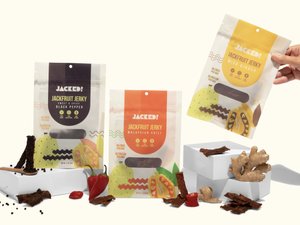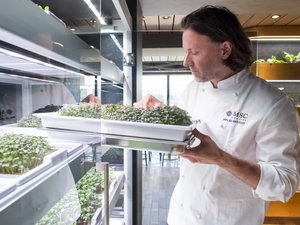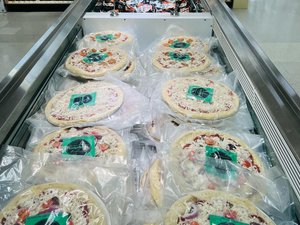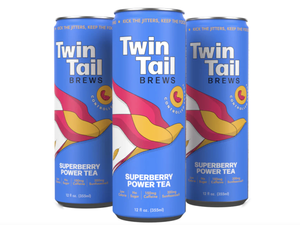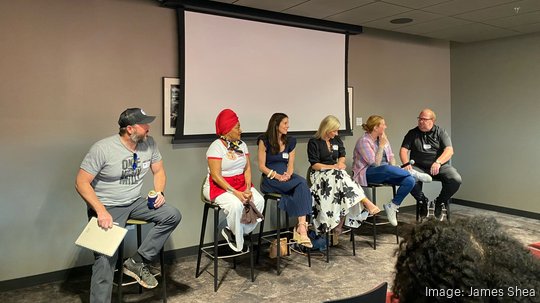
Having a grand idea for a food product is one thing — but scaling it to reach hundreds of stores is something else entirely.
That was one takeaway from a Startup Virginia panel on June 14 that featured a group of Richmond food startup founders. The event was moderated by Shane Emmet, who sold his Richmond-based food startup, Health Warrior Superfoods, to PepsiCo in 2018.
Joye B. Moore, founder of dessert maker Joybells, has taken her family’s recipes and created a successful startup. Her products are sold at Sam’s Club, Food Lion and other grocery chains. It was not an easy path, she said. And it all started in her kitchen.
She eventually moved into Richmond food incubator Hatch, which offers access to a commercial kitchen. Her family helped her with the baking and shipping for little to no money for years. She eventually was able to hire several of them.
She said the best advice she was given was to build systems and processes early on so the business can scale. That way, when a company takes off, “you don’t have to back track and fix things,” she said.
Navy Hill founders Jenny Lucas and Katie Williams came up with the idea for a spirits company over drinks together. The bartender recommended a vodka with half soda, half tonic. They liked the cocktail and had not seen it marketed.
Their company has evolved drastically since its founding in 2017. The pair started making mixers and eventually became a drink manufacturing company, which required them to navigate a complicated alcohol distribution system.
Navy Hill was not started in a kitchen. The founders worked with a food scientist to develop recipes and hired a contract manufacturing company, also called a co-packer. Lucas and Williams said they had to select and hire the right partners to advance the company.
“It’s been a journey,” Williams said.
Xavier Meers and Hannah Pollack are the husband-and-wife team who founded Nightingale Ice Cream Sandwiches in 2016. The two worked as chefs together at Belle Vie restaurant in Midlothian, and Pollack began experimenting with ice cream sandwiches. They said their key to success has been a focus on quality. Rather than hiring a contract manufacturer, Nightingale manufacturers its products at a facility in Richmond. Pollack said that means the company peels real bananas rather than purchasing tubs of banana puree.
“We came from the restaurant business, so we have a passion for food,” Pollack said. “That is what we try to get across in our products.”
Moore said she tried to find a way to scale Joybells without contract manufacturing but could not find a way to do it. She and her family were producing 900 pies a week when they were approached about entering Sam’s Club, which today counts 600 U.S. locations. Moore said her company has always grown through finding the right partners, and that ended up being the case in that situation.
“We were honest and upfront,” Moore said. “I was like, ‘Hey, we would love to bring Sam’s Club into the Joybell family.’ But I said, ‘We can’t do it without a co-packer. We need some help.’ They were so committed to bringing on the brand that they introduced us to one of their private brand co-packers.”
Joybells worked with the co-packer for more than four months and fine-tuned its product. Today, the co-packer manufactures and distributes thousands of desserts monthly for Joybells, and Moore said the company has been “the perfect partner.”
Meers said a key moment for Nightingale was when the company decided to stop doing deliveries. He drove a beat-up refrigerated truck around for a long time, but during one run he got lost in Manhattan — which caused him to pump the brakes on his days as a driver. Nightingale was able to find a distributor.
“We got lucky enough and now work with the big guys,” Meers said.
Williams said Navy Hill had to understand the food distribution business through trial and error. When it started as a mixer company, the founders were putting the product in the back of their car and delivering it to stores. They eventually found a distributor, but they said it was a time-consuming process. Many did not care about their product. They eventually found a type of distributor who cares about the product and made sure Navy Hill was placed on the shelves properly.
“When you get into the alcohol side, it’s like a totally different ballgame,” Williams said.
Lucas said the work can be stressful, but the team tries to keep things in perspective. The company is selling a beverage and “not saving the world,” she said.
